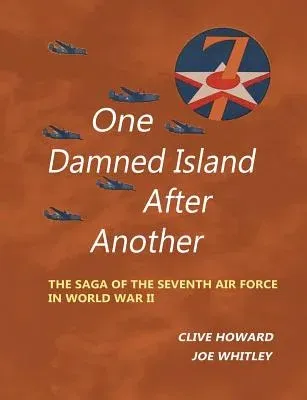This is the official history of the Seventh Air Force. It is not a
"brass hat" story; it is told from the point of view of the men
themselves, often in their own words, with realistic vigor and with the
lively sense of humor that made it possible to achieve victory in the
Pacific.
On 19th October 1940, the Hawaiian Air Force, later known as the
Seventh Air Force, was established to provide air defense of the
Hawaiian Island and to engage with threats in the Pacific.
Just over a year later the Japanese attack on Pearl Harbor devastated
this force. Out of a total of 231 aircraft of the Hawaiian Air Force, 64
were destroyed and not more than 79 were left usable.
Out of the inferno emerged the newly reformed Seventh Air Force.
It faced, in the central Pacific, the largest water theater in the world
-- sixteen million square miles, five times the size of the United
States.
The Americans patched up their planes as best they could and began to
fly the "Atoll Circuit," the low-lying, white sand atolls and the first
stepping stones on the long road to Tokyo.
In this huge area and against a fearsome opponent, the men of the
Seventh were forced to fly the longest missions in any theater of war,
entirely over water and, at first, without fighter escort.
They fought at Midway, Guadalcanal, Tarawa, Kwajalein, Eniwetok, Truk,
Saipan, Palau, the Philippines, Iwo Jima, and finally Tokyo.
Clive Howard and Joe Whitley's history of this remarkable air force
covers from the events at Pearl Harbor through to V-J Day, covering
every single island that the force landed on in between.
They listened to demand of Corporal Earl Nelson's article "Heroes Don't
Win Wars", that criticised the press and radio that only recorded the
fantastic achievements of men who wore medals; "Why don't they talk
about the guy who is just a soldier?"
So with humor and insight Howard and Whitley and provided us with a
history of the Seventh Air Force that doesn't focus on only the glorious
achievements of some men, nor does it simply record the accounts of the
"brass hats", but instead gets to the heart of what the men of this
extraordinary force did and thought.
Clive Howard and Joe Whitley were both sergeants and served as
correspondents for the Seventh Air Force. They were there; they saw it
happen.


